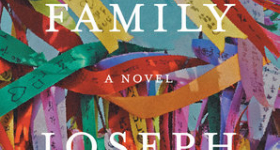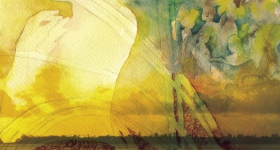Lindsay Wong’s memoir, The Woo-Woo: How I Survived Ice Hockey, Drug Raids, Demons, and My Crazy Chinese Family (Arsenal Pulp Press, November 2018), is as messy as the title suggests, exposing Wong’s disconnection and anger as she discovers the world beyond her dysfunctional home. Wong’s mother shows signs of bipolar disorder, her aunt evidences suicidal ideation and her grandmother is schizophrenic. The family believes their symptoms are caused by the Woo-Woo, a ghostly possession that must be escaped or exorcised. Wong’s memoir demonstrates how the gap between her parents’ impoverished childhood in Hong Kong and their wealthy immigrant life in Vancouver combines with Chinese culture to exacerbate the impact of the family's untreated mental illnesses.
To tell her story, Wong uses profanity-laced dialogue in English-learner’s grammar as well as sometimes funny, sometimes poignant expository turns of phrase. Here, Wong leans on humor:
Looking back, we were superstitious, paranoid Chinese suburbanites who were trying our best to fit in. We were haunted by the Woo-Woo ghosts, to the point where if someone fell down or cut their finger, it was blamed on a nasty spirit — “Aiya! Get the Polysporin! But make sure there are no ghosts in the fucking medicine cabinet!"
However, sadness is never far away:
Neither [my cousin] nor I received specific affection, kindness or genuine compassion from our mothers, and I think it caused us both to feel a damp and aching sadness, a childhood arthritis in our half-grown bones.
Wong’s story highlights the contrasts experienced by immigrants who grew up in poverty but are able to amass wealth in their adopted country. Food is a complex subject for the family.
My mother and her siblings had grown up with nothing to eat but all the cigarettes they cared to smoke. Gung-Gung, my grandfather, doled out economy packs like candy …. As soon as you turned 2 years old, Gung-Gung proudly handed you your very own pack to help with the hunger.
The anecdote echoes in Wong’s childhood; when her mother is depressed, Wong subsists on mountains of candy and junk food. At Chinese New Year, the older generation orders a huge feast: “everything and anything … to make up for not eating when they were children.” However, her mother criticizes her ferociously when Wong becomes pudgy during puberty. “Our family was compulsively preoccupied with an unattainable thinness, so an average-sized North American was thought to require a gastric bypass.”
The Wong children may appear poor because they are often unkempt, but they live in a McMansion on a plateau outside of Vancouver populated by “millionaire migrants of Asia.” The neighborhood is nicknamed the Poteau because many of the fancy properties on the mountaintop are used to farm marijuana. The family vacation home is an RV pulled by a pickup truck. On a trip to a desert town called Osoyoos, Wong’s aunt, uncle and cousins follow in an identical setup. Wong reports:
We did not stop, driving like we were all being chased by some very murderous Woo-Woo, which we were, in a way. My parents suffered from a permanent refugee mindset, acting as if we could be deported or mass murdered anytime, especially when a new prime minister was elected.
The main objective of the trip is to take a vacation from Poh-Poh, Wong’s schizophrenic grandmother. Wong’s mother tells Poh-Poh, “If you can’t pronounce [Osoyoos], you can’t come. Boo hoo. I know it really sucks to be you.” But really, it sucks to be on the vacation:
There was nothing to do in Osoyoos for our type of suburban Chinese family … [our RVs] had the frigid luxury and malfunctioning comfort of unplugged commercial freezers. This was what we thought real North Americans did: that we were fruitfully living the American dream if we owned a brand-new RV per family...So for an entire month, to prove that we had assimilated and succeeded in the New World, we sat in our housecoats and mostly watched each other across a foldable table.
Wong reinforces some cultural stereotypes. In a fresh description of the old cliché, she tells us that for her mother, having a son “was like suddenly becoming the owner of a fancy new Porsche, whereas being the mother of a girl was like leasing a Toyota.” When her mother’s mental health falters, Wong can still find the funny side:
It’s in the DNA and cultural beliefs of almost every village Chinese family to think they are being haunted by ghosts, gwei, every so often, especially if a new baby is born exceptionally ugly or someone gets a shocking grade on the SAT.
The influence of Chinese culture on Wong’s family becomes less commonplace as her mother’s mental health worsens. When Wong’s mother disappears for a week, her father would “not trust outsider lo-fahn authority with such horrible family matters … we just had to wait. This was the candid, respectable, saving-face Chinese way; doing absolutely nothing.” Wong’s mother frequently tries to escape from the Woo-Woo by making her children run around the block or stay in brightly-lit, populated areas like the food court at the mall, but in an especially traumatic exorcism attempt, she purposely burns her daughter’s foot. Wong’s father remains uninvolved, “afraid that my mother would set him on fire if he dared interfere, or even worse, force him to survive on nothing but burnt toast for the week.” The other Wong children know what they are expected to do:
Someone could be twitching on the floor, obviously and deliriously Woo-Woo, and we would still be leisurely slurping our breakfast of water congee and dehydrated egg … The Wongs: Chinese stoicism gone wrong, too terrified or pragmatic to squeal for help …
When her aunt threatens suicide, Wong is “quite certain she would not die — because everyone in our family always talked about self-extermination as if they were casually commenting on dinner.” The constant state of trauma alert feels to Wong “like building a tornado shelter on the West Coast when everyone knew that our undoing would be a 9.8 magnitude earthquake.” Her aunt steps out on a bridge to fulfill her threat, stopping Canada Day holiday traffic. If Wong is still trying to be funny, she is soon vanquished:
The Woo-Woo’s Chosen did not have mental breakdowns in public, especially on public holidays … We always went quietly back to our houses, put on our frumpy pastel housecoats, and then went hopelessly, incurably insane. As if by hiding our sickness … we could pretend that it did not exist outside of our family’s private sphere and Hongcouver’s closed-door Chinese community.
Earlier, Wong had described how her own brokenness was reflected in a miserable playmate:
… we were like unfortunate amphibians locked in the same pet store terrarium … I saw my ugliness and short-tempered wretchedness mirrored in her scrunched-up skin and glassy, bewildered eyes. It was as if I were hearing my voice for the first time on a tape recording and was shocked by how strange and tinny it sounded.
After Wong gets in a fight as a teen, a school counselor tells her she lacks empathy. Wong’s father mistakes the word “empathy” for “empty” and asks, “Lindsay, why they call you empty? Some new bullshit term for well-rounded?” The school counselor tries to help Wong develop compassion by assigning her to be an aide for a student with disabilities. The friendship that results is the first of several that help Wong begin to heal from her childhood.
Wong’s father specializes in dark, sometimes barbaric, humor. As the sardonic tone of the book proves, Wong learns to face the world on his terms: “unflinchingly nasty when overwhelmed and burdened by family drama.” It remains a bit surprising that she can say, “I find my father’s jokes funny now,” considering that “his black humour wounded me as a child … like a dull axe through the skull.” Readers may find her glib accounts of mental health breaks to be unforgivably cruel. On the other hand, this memoir puts the reader into a pair of very uncomfortable shoes. After spending some time in them, perhaps one can allow Wong the approach that lets her cope with the cloud that hangs over her: she fears that she will become, like the older women in her family, “the embodiment of sickly terror, darkly hilarious only to those who didn’t have any idea how else to love me.”










Comments